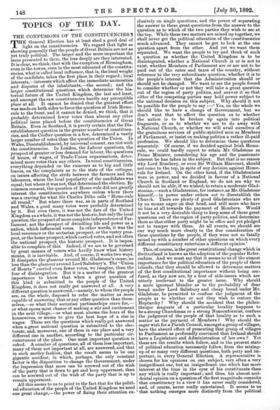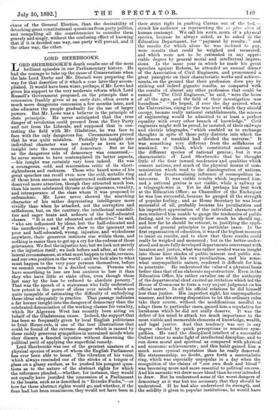TOPICS OF THE DAY.
THE CONFUSIONS OF THE CONSTITUENCIES. THE General Election has at least shed a good deal of light on the constituencies. We regard that light as showing generally that the people of Great Britain are not as yet truly political. The larger and the more important the issue presented to them, the less deeply are they interested. It is clear, we think, that with the exception of Birmingham, even in the towns, even in the most educated of the constitu- encies, what is called local influence, that is, the local weight of the candidate, takes the first place in their regard ; local interests,—interests which affect the immediate animosities and disputes of the inhabitants,—the second ; and the larger constitutional questions which determine the his- torical future of the United Kingdom, the last and least, and amongst the raw constituencies hardly any perceptible place at all. It cannot be denied that the greatest effort was made on both sides to force the question of Irish Home. rule to the front, and it cannot be denied, we think, that it probably determined fewer votes than almost any other political issue placed before the constituencies of Great Britain. Even in Scotland, it is pretty certain that the Dis- establishment question in the greater number of constituen- cies, and the Crofter question in a few, determined a vastly larger number of votes than the question of the Union. In Wales, Disestablishment, by universal consent, ran riot with the constituencies. In London, the Labour questions, the prospect of greater or less demand for labour, the questions of hours, of wages, of Trade-Union organisations, deter- mined more votes than any others. In rural constituencies, everything depended on the rumours as to big and little loaves, on the complaints as to the state of the cottages, on issues affecting the strife between the farmers and the labourers, where the local popularity of the candidates was equal; but where it was not, that determined the election. By common consent, the question of Home-rule did not greatly interest the constituencies anywhere unless where there was a craving for what Sir Charles Mike calls "Home-rule all round." But where there was, as in parts of Scotland and Wales, a good many votes were probably determined by it. But even there, it was not the fate of the United Kingdom as awhole, it was not the historic, but only the local question, the prospect of more complete independence of Par- liament, not the prospect of dwindling life and power as a nation, which influenced votes. In other words, it was the local reverence or the sectarian prospect, or the vestry pros- pect, or the home prospect, which carried votes, and not often the national prospect, the historic prospect. It is impos- sible to complain of this. Indeed, if we are to be governed by great masses of voters who hardly know what history means, it is inevitable. And, of course, it works two ways. It dissipates the glamour around Mr. Gladstone's cause, no less than the glamour around Lord Salisbury's. The "Union of Hearts" carried even fewer votes, we imagine, than the fear of disintegration. But it is a matter of the greatest importance to know that when a great question of this kind is submitted to the people of the United Kingdom, it does not really get answered at all. A very different question is answered, —namely, to whom the people are, on the whole, disposed to refer the matter as more capable of answering that or any other question than them- selves,—or what their sectarian partisanships crave for,— or what opens most chance of making a stir and excitement in the next village,—or what most alarms the fears of the housewives, or seems to give the best hope of a rise in wages. These are the questions which really get answered when a great national question is submitted. to the elec- torate, and, moreover, one of them in one place and a very different one in another, according to the particular cir- cumstances of the place. One most important question is asked. A number of questions, all of them less important, many of them not important at all, are answered, and that in such motley fashion, that the result seems to be one gigantic accident, in which, perhaps, the only constant factor is the disposition to change the Government, under the impression that more can be screwed out of the wish of the party that is down to get and keep uppermost, than can be screwed out of the wish of the party that is up to remain uppermost. All this seems to us to point to the fact that for the politi- cal education of the people of the United Kingdom we need one great change,—the power of fixing their attention ex- elusively on single questions, and the power of separating the answer to these great questions from the answer to the question as to which of the two parties they wish to see at the top. While these two matters are mixed up together, we shall never get the political education of the constituencies much advanced. They cannot be got to look at the one question apart from the other. And yet we want them separated. We want the people to try and think of such a question as whether the United Kingdom is to be disintegrated, whether a National Church is or is not to exist, whether Members of Parliament are or are not to be paid out of the rates and taxes of the country, without reference to the very subordinate question, whether it is to the people's interest that the Administration should or should not be changed. We want to see the people forced to consider whether or not they will take a great question out of the region of party politics, and anal% er it so that either of the competing parties may hold power subject to the national decision on this subject. Why should it not be possible for the people to say :—` Yes, on the whole we should like to have a change of Government, but we don't want that to affect the question as to whether the nation is to be broken up again into political fragments, or as to whether we are to do away with a National Church, or whether we will avail ourselves of the gratuitous services of public-spirited men as Members of Parliament, or insist on making politics a rather ill-paid profession. We should like to determine these questions separately. Of course, if we decided against Irish Home- rule, we could hardly expect to retain Mr. Gladstone as Prime Minister, considering his age and the passionate interest he has taken in the subject. But that is no reason why Lord Rosebery, or even Sir William Harcourt, should not come to the top, in spite of any decision against Home- rule for Ireland. On the other hand, if the Gladstouians were in power, and we decided in favour of a National Church in Scotland or England, we do not see why we should not be able, if we wished, to retain a moderate Glad- stonian,—such a Gladstonian, for instance, as Mr. Gladstone himself,—in power under orders not to disestablish the Church. There are plenty of good Gladstonians who are by no means eager on that head, and still more who have no bias at all towards the payment of Members. Would it not be a very desirable thing to keep some of these great questions out of the region of party politics, and determine them so that either party might be in office and yet pledged not to tamper with them. At all events, we should see our way much more clearly to the due consideration of these questions by the people, if they were not so fatally mixed up with a number of other questions on which every different constituency entertains a different opinion.'
This, of course, is the great constitutional change which in Switzerland is known as the adoption of the popular Refer- endum. And we must say that it seems to us of the utmost importance for the political education of the people of these islands, that they should be allowed to determine matters of the first constitutional importance without being con- fused, as they now are, by a host of side-issues which are utterly irrelevant to the greater issue. Why should a mere ignorant blunder as to the probability of dear bread under Lord Salisbury and cheap bread under Mr. Gladstone, be permitted to confuse the judgment of the people as to whether or not they wish to restore the Heptarchy ? Why should the accident that the philan- thropic magnate of a particular locality happens to be a strong Churchman or a strong Nonconformist, confuse the judgment of the people of that locality as to such a matter as the payment of Members ? Why should the eager wish for a Parish Council, amongst a group of villages, have the absurd effect of presenting that group of villages to Parliament as profoundly convinced that Ireland should have a Legislature and Administration of her own ? Yet these are the results which follow, and in the present state of political education necessarily follow, from the mixing- up of so many very different questions, both petty and im- portant, in every General Election. A representative is chosen for his opinions on one subject, very often a very insignificant one, but an insignificant one which has more interest at the time in the eyes of his constituents than any which is really important ; and thus, his almost acci- dental opinion on a question of the first magnitude commits that constituency to a view it has never really considered, and, of course, never really entertained. It seems to us that nothing emerges more distinctly from the political . chaos of the General Election, than the desirability of detaching great constitutional questions from party politics, and compelling all the constituencies to consider them gravely and singly, without the confusing effect of knowing that if it is decided one way, one party will prevail, and if the other way, the other.



































 Previous page
Previous page